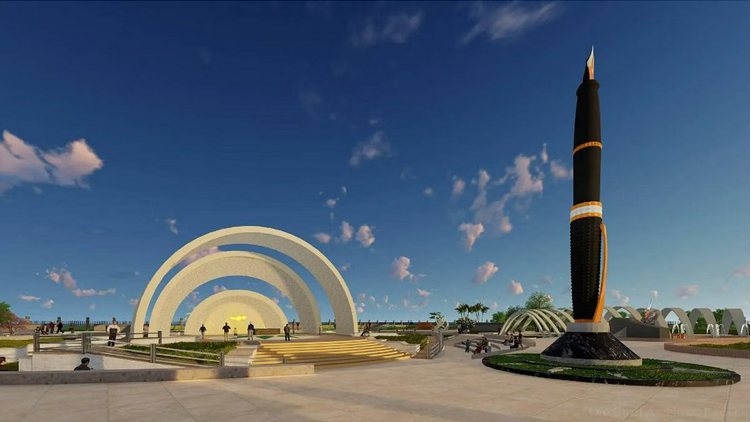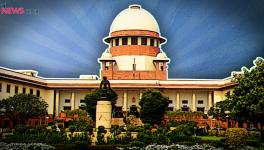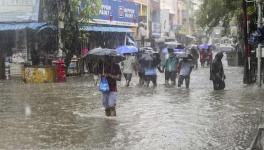Why Environmentalists, Fishermen Oppose Karunanidhi Coastal Memorial

An impression of the proposed monument. Image courtesy: @mkstalin.
When former Tamil Nadu chief minister (CM) and DMK patriarch M Karunanidhi died in 2018, the then-AIADMK government did not grant permission for his burial on Chennai’s Marina Beach. Then-Opposition leader and Karunanidhi’s son MK Stalin waged a legal battle to get approval for the burial.
After the DMK came to power in July 2022, the Stalin government proposed an offshore monument along the beach in his memory. The Rs 81-crore project would cover a total area of 8551.13 sq mt consisting of the 134-feet pen pedestal on the sea pedestrian walkway, a lattice bridge and an underground museum.
However, environmentalists contend that the statue would impact the area’s ecosystem and fishermen’s livelihood. Yet the Union Ministry of Environment, Forest and Climate Change (MoEF) gave the project the Coastal Regulation Zone (CRZ) clearance.
The Supreme Court will hear several pleas, including one filed by the AIADMK, against the monument on July 14.
Several statues and monuments such as the Shivaji Smarak and Statue of Unity have been built in different parts of the country despite local resistance.
‘FLORA AND FAUNA WILL BE DESTROYED’
Environmentalists argue that the project will damage the environment and the marine biosphere.
“Concrete structures within the sea will surely disturb the flora and fauna. This is an unavoidable scientific truth. Construction will pollute the space in many forms with material seeping into the water,” fisherman and activist K Saravanan told Newsclick.
The proposed area for the monument is a marshy region, an important region for fish breeding, he said. “We won’t be able to fish. Maximum fish breeding occurs in marshy and hilly areas.”
Saravanan alleged that the “government conducted a survey within two hours of 50 kg-60 kg of fish recently caught in the area and said that no boats were visible within a five km radius”.
Arguing that “sea cannot be recreated”, he said, “When trees are felled to construct roads, saplings are planted somewhere else to make up for the loss. Can the sea be recreated?”
‘CRZ NOT FOLLOWED PROPERLY’
Environmentalists also allege that the environmental impact assessment (EIA) was not done properly. CRZ notification was issued for the first time in February 1991 under the Environment Protection Act, 1986, to regulate coastal area activities.
Advocate Vetriselvan, of environmental organisation Poovulagin Nanbargal said, “According to the CRZ notification, climate impact study is a mandatory part of the EIA—but it was not done for this project.”
Vetriselvan added that “changes in the shoreline is an important aspect that should be considered before giving clearance. Tamil Nadu’s coastal areas are going through various changes over the past two to three decades”.
For example, a IIT Madras study showed that “sea-level change and sea flooding will majorly impact the coastal regions of Tamil Nadu. These kinds of studies were not adequately considered for this project”, he said.
The government mentioned a 2016 study containing data from previous decades, he said. “But the current data on shoreline changes and coastal region, especially sea erosion and sea aggression, weren’t considered in the EIA. Therefore, the EIA is not a scientific but a half-baked study,” Vetriselvan alleged.
Climate change impact and effects of sea erosion on the building should be ascertained before constructing structures in coastal regions, he added. “No such assessment was done. Therefore, the building itself could be in danger.”
Saravanan contended that the “Kalaignar memorial cannot be constructed as per law. In 2015, a CRZ amendment mentioned that constructing a statue or memorial along the sea should be avoided and only allowed in exceptional circumstances when it cannot be constructed anywhere else, it should be initiated. Even in such a case, a proper EIA should be conducted”.
Moreover, the district administration must recommend to the state, which should send an application to the Centre, he added.
COMMERCIALISATION OF COASTAL REGION
Vetriselvan sees commercialisation of the entire coastal region following the statue’s construction.
“The Greater Chennai Corporation has proposed to turn the entire stretch from Thiruvottiyur to Besant Nagar Beach in Chennai into an ecotourism area. There is also a proposal for constructing malls and entertainment parks along the coast,” he said.
“Therefore, if the memorial is built, other buildings will come up around the coast. It will destroy the entire coastal region and deprive fishermen of their livelihood,” he added.
Asked about the Thiruvalluvar Statue and Vivekananda Memorial in Kanyakumari, he said, “The statue was constructed on the natural formation of rocks. The pen memorial will be constructed by erecting an artificial construction in the sea.”
Poovulagin Nanbargal has urged the Centre to consider the red flags raised by environmentalists against the proposed monument and withdraw the approval.
WHAT ABOUT THE KATTUPALLI PORT?
Janakarajan, former professor at the Madras Institute of Development Studies and an expert on water management, told Newsclick, “Any alterations on the coast will affect the coastal ecosystem—it could be monuments, dykes or ports. If you stop the coastal current in one place, it will lead to coastal erosion in some other place.”
Giving the example of the upcoming Kattupalli Port, he said, “It is the second deepest port in the world and its impact will be thousand times more than the proposed monument. Deep ports are constructed only in deep seas. The coast along Chennai is shallow. But politicians opposing the monument are not talking about the port.”
Kattupalli Port is part of Adani Ports and Special Economic Zone Limited (APSEZ), located north of Chennai. Tamil Nadu has three major ports in Chennai, Ennore and Tuticorn, and 15 minor ports along the Coromandel coast, which stretches for 1,076 km, including the Puducherry coastline.
Get the latest reports & analysis with people's perspective on Protests, movements & deep analytical videos, discussions of the current affairs in your Telegram app. Subscribe to NewsClick's Telegram channel & get Real-Time updates on stories, as they get published on our website.
























